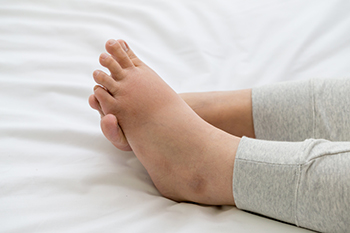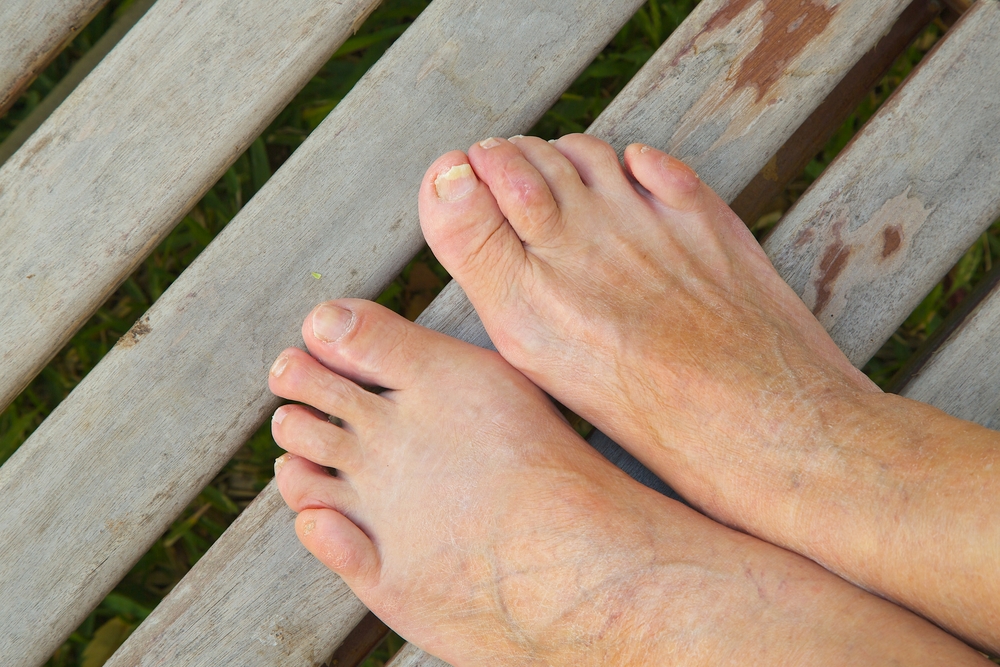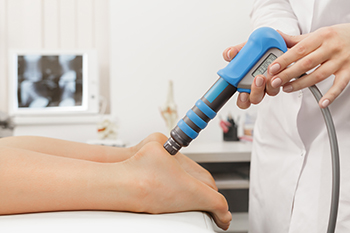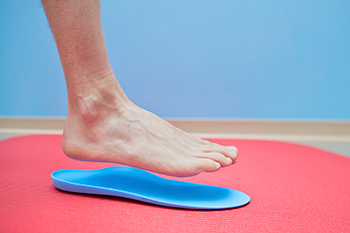Connect With Us
Blog
Items filtered by date: February 2023
Swollen Feet Can Be Related to Back Pain

Sometimes, an individual’s feet may swell up in size and become filled with extra bodily fluids. There are many different reasons why an individual might experience increased foot swelling. For example, when an individual is pregnant, they may have foot swelling. Sometimes, certain things that cause swollen feet can also result in lower back pain. Importantly, the two are not always linked, but sometimes can be. Pregnancy is one such condition that can cause both lower back pain and foot swelling. It is well-known that pregnancy is associated with swollen feet due to increased fluid accumulation. Additionally, due to the extra strain linked with carrying a baby to term, pregnancy can also cause pain in the lower back area. Pregnancy, of course, is not the only thing on the list that can cause both feet swelling and lower back pain. In addition to pregnancy, arthritis, piriformis syndrome, and infection can also cause these two symptoms through inflammation. It is suggested that you contact a podiatrist for more information about the link between swollen feet and back pain.
Swollen feet can be a sign of an underlying condition. If you have any concerns, contact one of our podiatrists of Tri-Town Podiatry. Our doctors can provide the care you need to keep you pain-free and on your feet.
Swollen feet are a common ailment among pregnant women and people who stand or sit for extended periods. Aging may increase the possibility of swollen feet and patients who are obese often notice when their feet are swelling too. There may be medical reasons why swollen feet occur:
- Phlebitis - A condition that causes the veins to become inflamed and can also cause leg pain.
- Liver disease - This may lead to low blood levels of albumin which is a protein. This can cause fluid in the blood to pass into the tissues and several areas of the body can become swollen.
- Heart failure - When the heart doesn’t pump properly the blood that is normally pumped back to the heart can pool in the veins of the legs causing swollen feet.
- Kidney disease - One of the main functions of the kidneys is releasing excess fluid in the body. This type of condition can make it difficult for the kidneys to function properly, and as a result the feet may become swollen.
- Deep-vein thrombosis (DVT)- This is a serious condition where blood clots form in the veins of the legs. They can block the return of blood from the legs to the heart which may cause the feet to swell. It is important to be treated by a podiatrist if this condition is present.
Swollen feet can also be caused by bone and tendon conditions, including fractures, arthritis, and tendinitis. Additionally, there may be skin and toenail conditions and an infection may cause the feet to swell. Patients who take medicine to treat high blood pressure may be prone to getting swollen feet.
Many patients elevate their feet to help relieve the swelling and this is generally a temporary remedy. When a podiatrist is consulted the reason behind the swelling can be uncovered and subsequently treated.
If you have any questions please feel free to contact our offices located in Arlington, Canton, and Chelsea, MA . We offer the newest diagnostic tools and technology to treat your foot and ankle needs.
Two Types of Hammertoe

Hammertoe is a common foot condition and is considered to be a deformity. It is noticeable as the joints in the middle toes bend upward, forcing the toes to point downward, somewhat resembling a hammer. It generally happens as a result of wearing shoes that do not have adequate room for the toes to move freely in, gradually causing them to shift abnormally. Some patients develop corns on top of the affected toes, as they touch the top of the shoe while walking. Hammertoe can fall into two categories that are referred to as flexible or rigid. As the name implies, flexible hammertoe can move at the joint, and relief may come from using a protective pad. Rigid hammertoe may press the joints out of alignment, and different relief methods may be used. If you have any form of hammertoe, it is a good idea to confer with a podiatrist who can determine what the best course of treatment is for you.
Hammertoe
Hammertoes can be a painful condition to live with. For more information, contact one of our podiatrists from Tri-Town Podiatry. Our doctors will answer any of your foot- and ankle-related questions.
Hammertoe is a foot deformity that affects the joints of the second, third, fourth, or fifth toes of your feet. It is a painful foot condition in which these toes curl and arch up, which can often lead to pain when wearing footwear.
Symptoms
- Pain in the affected toes
- Development of corns or calluses due to friction
- Inflammation
- Redness
- Contracture of the toes
Causes
Genetics – People who are genetically predisposed to hammertoe are often more susceptible
Arthritis – Because arthritis affects the joints in your toes, further deformities stemming from arthritis can occur
Trauma – Direct trauma to the toes could potentially lead to hammertoe
Ill-fitting shoes – Undue pressure on the front of the toes from ill-fitting shoes can potentially lead to the development of hammertoe
Treatment
Orthotics – Custom made inserts can be used to help relieve pressure placed on the toes and therefore relieve some of the pain associated with it
Medications – Oral medications such as anti-inflammatories or NSAIDs could be used to treat the pain and inflammation hammertoes causes. Injections of corticosteroids are also sometimes used
Surgery – In more severe cases where the hammertoes have become more rigid, foot surgery is a potential option
If you have any questions please contact our offices located in Arlington, Canton, and Chelsea, MA . We offer the newest diagnostic and treatment technologies for all your foot and ankle needs.
Does Shockwave Therapy Help With Plantar Fasciitis?

Plantar fasciitis is an annoyingly painful condition where the plantar fascia running along the sole of the foot becomes inflamed or sustains microtears. Shock wave therapy uses pressurized air or electromagnetic pulses to deliver ultrasound energy to the feet. There are low and high-energy shock wave treatments. The low-energy treatments are given in a series of three or more sessions. These can be mildly painful if there is any pain at all. High-energy shock wave treatments are given in one session and can be quite painful, sometimes requiring anesthesia. Either treatment is thought to work by inducing microtrauma in the affected tissue. This initiates healing by causing blood vessel formation and increased delivery of nutrients to the affected area. New shockwave treatments are under continued development and reports differ on their success. If you are interested in finding out more about shockwave therapy for persistent plantar fasciitis, see a podiatrist who can help you determine if this is a treatment that may be right for you.
Shockwave therapy is a treatment commonly used to treat various injuries and conditions, particularly plantar fasciitis in the feet. To learn more, consult with one of our podiatrists from Tri-Town Podiatry. Our doctors can provide the care you need to keep you pain-free and on your feet.
Shockwave Therapy
Shockwave therapy is a new treatment option designed to treat bone conditions such as tennis elbow, shoulder pain, and others. Shockwave therapy uses high intensity sound waves that are directed to the affected tissues of the body with pinpoint accuracy. The effects are very beneficial, leading to a production of collagen fibers, eliminating inflammation.
Who Benefits from Shockwave?
Shockwave is recommended for patients suffering from heel pain and associated problems. Heel pain is a common condition which can be caused by obesity, overexertion, and spending a substantial amount of time on hard floors with your feet exposed and unsupported.
Fast and Easy
The therapy is actually a simple process that can leave patients feeling better the very next day. Shockwave therapy is not as dramatic as it sounds. It enables more blood flow to effected areas, addressing the source of the problem and allowing treatment to last for a long time.
Treatment & Recovery Time
Shockwave treatment will enable your feet to recover quickly. This is especially important since surgery is not required. It is cost effective and does not require the use of anesthesia. This treatment is a better option to surgery, since it is proven safe.
If you have any questions, please feel free to contact our offices located in Arlington, Canton, and Chelsea, MA . We offer the newest diagnostic and treatment technologies for all your foot and ankle needs.
Wounds That Don't Heal Need to Be Checked
Several Reasons Why Orthotics Are Worn

Podiatrists often prescribe orthotics that may help various foot conditions. The joints in the feet and ankle undergo stress while walking and running, and wearing orthotics may help to relieve some of this pressure. Many patients have found they are able to walk or run faster, and this may be a result of the shock absorption that can come from wearing orthotics. Diabetic patients can benefit from wearing orthotics, which may help to prevent injuries that can happen from the inability to feel nerve damage. Additionally, orthotics may help to distribute the body’s weight evenly, possibly preventing corns and calluses from developing. If you have any type of foot condition, it is strongly suggested that you are under the care of a podiatrist who can determine if orthotics are right for you.
If you are having discomfort in your feet and would like to try orthotics, contact one of our podiatrists from Tri-Town Podiatry. Our doctors can provide the care you need to keep you pain-free and on your feet.
What Are Orthotics?
Orthotics are inserts you can place into your shoes to help with a variety of foot problems such as flat feet or foot pain. Orthotics provide relief and comfort for minor foot and heel pain but can’t correct serious biomechanical problems in your feet.
Over-the-Counter Inserts
Orthotics come in a wide variety of over-the-counter inserts that are used to treat foot pain, heel pain, and minor problems. For example, arch supports can be inserted into your shoes to help correct overarched or flat feet, while gel insoles are often used because they provide comfort and relief from foot and heel pain by alleviating pressure.
Prescription Orthotics
If over-the-counter inserts don’t work for you or if you have a more severe foot concern, it is possible to have your podiatrist prescribe custom orthotics. These high-quality inserts are designed to treat problems such as abnormal motion, plantar fasciitis, and severe forms of heel pain. They can even be used to help patients suffering from diabetes by treating foot ulcers and painful calluses and are usually molded to your feet individually, which allows them to provide full support and comfort.
If you are experiencing minor to severe foot or heel pain, it’s recommended to speak with your podiatrist about the possibilities of using orthotics. A podiatrist can determine which type of orthotic is right for you and allow you to take the first steps towards being pain-free.
If you have any questions please contact our offices located in Arlington, Canton, and Chelsea, MA . We offer the newest diagnostic and treatment technologies for all your foot and ankle needs.

